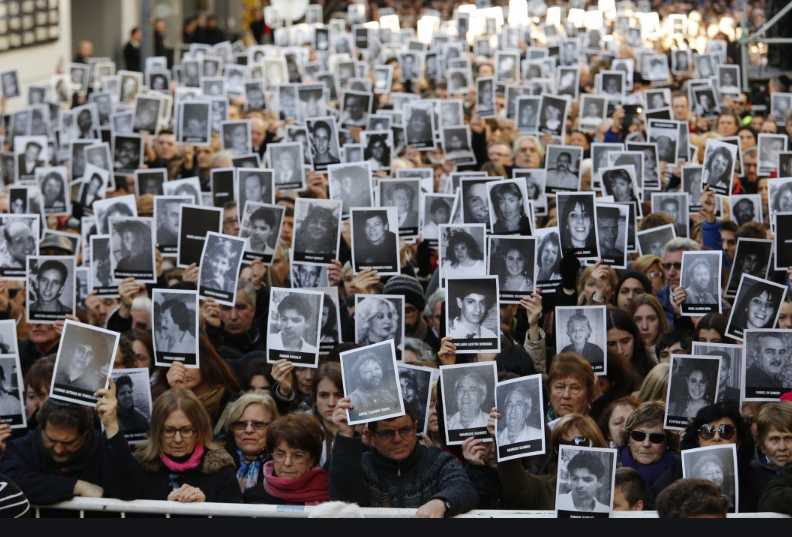Jewish Success in Latin America
AJC's leading expert on Latin America gave a thumbs up about how Jews are thriving south of the border when she spoke in Atlanta Monday.

The American Jewish Committee’s leading expert on Latin America gave a thumbs up about how Jews are thriving south of the border when she spoke in Atlanta Monday.
Dina Siegel Vann, who is the director of the AJC’s Belfer Institute for Latino and Latin American Affairs in New York, painted a generally positive picture of life for the 400,000 Jews in the three sizable communities of Mexico, Brazil and Argentina.
Part of the reason is the excellent relations that Israel has with those three nations and many other states in the region.
“I would say that relations between Israel and Latin America are at their peak. Much of that has to do with Prime Minister Netanyahu’s decision to make an effort to reengage with that part of the world beginning in 2016. The last three years have been like honey, just great.”
In 2016 Netanyahu became the first Israeli prime minister to visit South America when he made a trip to Argentina, Colombia and Mexico. He followed that up in December 2018 when he attended the inauguration of Brazil’s new president, Jair Bolsonaro.
Although there are significant exceptions like Cuba, Venezuela and Bolivia, which don’t have diplomatic relations with Israel, Siegel Vann said that Latin American countries are eager to engage with the Jewish state because of the technology Israel can offer. Israel is a leader in such important areas as water management, cybersecurity, medical technology and alternative energy, and Netanyahu’s visit was a big boost to economic ties, she said.
In Mexico, the recently elected mayor of Mexico City, Claudia Sheinbaum, is Jewish, the first woman and the first Jew to occupy the office. She is a close ally and a trusted advisor to Mexico’s popular president, Andres Manuel Lopez Obrador, and Siegel Vann predicted that one day she could become president herself.
Another reason why Mexico’s 40,000 Jews are doing well, is that they live in closely knit communities, which have a solid history of support for schools and other resources and a strong family ethic. This is also true of Brazil, where 110,000 Jews live, and in Argentina, with its 250,000 Jews.
“Jews in Argentina have an incredible institutional network.” Siegel Vann pointed out, “It’s really impressive, and when it comes to advocacy on behalf of the community, it’s amazing what they have done. They almost don’t need AJC’s help to get their story out to the public in Argentina.”
Still, in America, the AJC has been instrumental in telling the saga of the ups and downs Jews have suffered in Argentina over the last century.
The organization helped to organize a series of events during the last several weeks in major American cities to commemorate the 25th anniversary of the tragic bombing of Asociacion Mutual Israelita Argentina, the Jewish community’s headquarters building in Buenos Aires. The bombing, in 1994, killed 85 and injured another 300. Most were Jews.
The explosion was said to be the work of Hezbollah and Iran’s Revolutionary Guard, but almost all of those who have been accused of the crime have never been brought to justice. On Sunday night Siegel Vann was one of the featured speakers about the bombing at AJC’s program at Congregation Or Hadash in Sandy Springs.
Last month, on July 18, the actual anniversary of the tragedy, national leaders of the AJC attended a diplomatic conference in Buenos Aires where Argentina’s President Mauricio Macri became the first Latin American leader to officially designate Hezbollah as a foreign terrorist organization. He also decreed the day one of national mourning.

Nonetheless, Aug. 11, Macri suffered a stunning blow to his re-election chances when his leftist opponent Alberto Fernandez and his running mate, the former president, Cristina Kirchner outpolled him in a primary election landslide victory. Kirchner is generally seen as a having a controversial and often adversarial relationship with the Jewish community, but Siegel Vann urged caution in interpreting the result of Sunday’s primary election.
“We at the AJC, want to engage with her if she is elected. We don’t believe everyone in her party is corrupt and bad, so we have to find a way to reconnect. Let’s see what happens.”
Despite the success of Latin America’s Jews in navigating the winds of change, the region has deep problems, according to Siegel Vann. Foremost among those issues, is what she describes as the long-term, continuous pressure created between the haves and the have-nots.
“What is needed and what AJC continues to work for,” she concluded, “is strong economic and political support for the nations of the region. What it is going to take is for the present administration to understand that we are all in this together; it is not us and them.”



comments